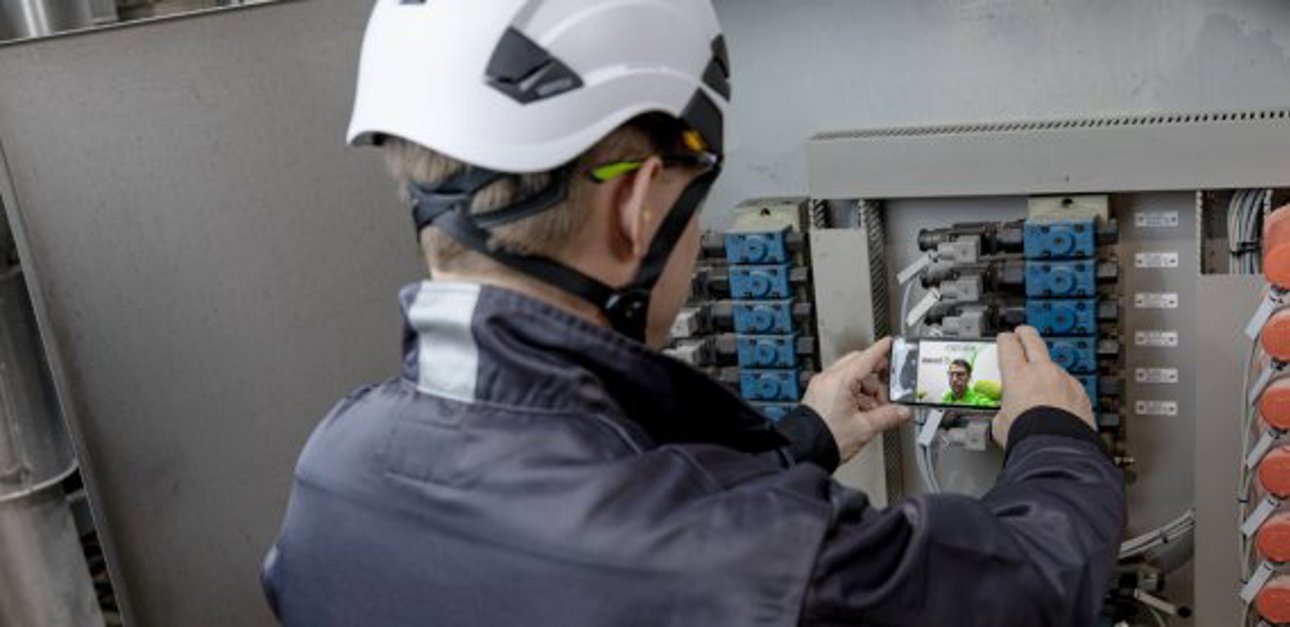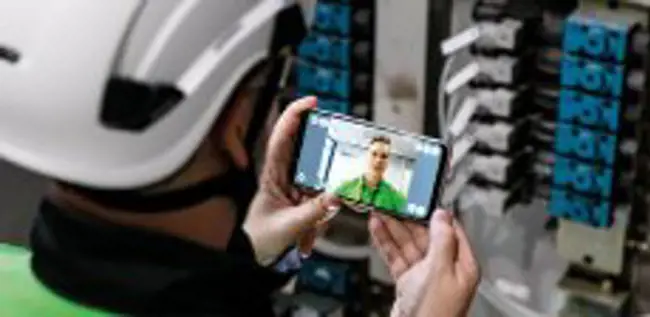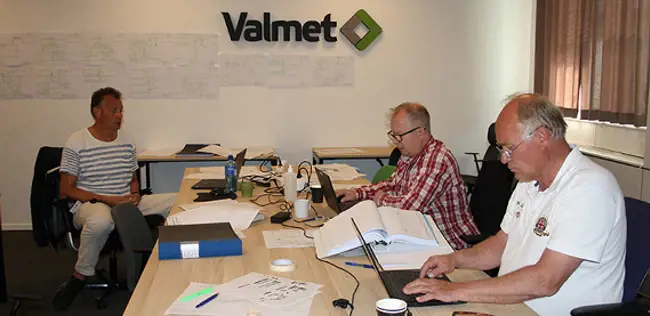Remote services prove valuable during the Covid-19 pandemic
Dec 18, 2020
Remote services option has proven very valuable for many customers, during the Covid-19 pandemic. Discover how Valmet’s experts have helped our customers around the globe to ensure the continuity of their operations with remote tools and connections.

Case 1: HUNAN HAIHUA, CHINA
Remote Inspection Guidance for recovery boilers
To secure the customers’ operations even during these exceptional times, Valmet has introduced Remote Inspection Guidance – a standard way of executing recovery boiler inspections by Valmet’s global network of technical experts, supported by the Inspection team based in Gothenburg, Sweden.
“Our customer Hunan Juntai New Material Technology Co., Ltd., based in Hunan Huaihua, China, ordered an annual inspection for their recovery boiler. Travel restrictions meant we couldn’t fulfill the order as such. Instead, we offered them the option of running the inspection following our newly launched Remote Inspection Guidance,” explains Magnus Kammerlind, Product Manager Inspections.
“Prior to the site visit, we organized an online meeting at which we discussed the details of the site visit, and went through the instructions and the priority list for the actual work. At the site, our colleague carefully documented everything he saw in photos and in text, and we went through the issues requiring attention together. Our local experts in China then discussed the issues further with the customer,” Kammerlind explains the procedure in detail.
“We received many good suggestions, and the high-risk findings for tube cracks were especially valuable. Some can be corrected immediately, while the correction of some will be planned. The service differed greatly from our previous supplier’s, and I hope to book Valmet’s professional service next time,” Mr. Chen Wensheng, Director of the mill facility department, says.
Case 2: BABINA GREDA, CROATIA
A maintenance shutdown goes online
The Covid-19 pandemic changed the plans for the annual shutdown operated by Valmet at the Babina Greda power plant in Croatia. Thanks to secure remote connections with Valmet’s service centers in Finland and Austria, the two-week shutdown in August 2020 was successfully carried out on time and within scope.
“Every shutdown is challenging – but this year, the coronavirus measures made it even more so. You can’t completely avoid contact with others during maintenance breaks, because people need to physically work together in a confined space,” Plant Manager Zlatko Raso explains.
To minimize the risk of exposure to the disease, the maintenance plans were swiftly revised to include social distancing and the use of face masks. The number of external service providers on site was reduced, and online remote connections were used to communicate with boiler and automation experts at Valmet’s service centers in Lapua and Vantaa, Finland, and Vienna, Austria.
“Normally, four to five experts from these service centers participate in our shutdown. But based on the travel restrictions, none was able to be physically present on site this time. So, they provided us with remote support instead. We’d previously used remote connections for smaller tasks – but never before for any major shutdown work,” Raso says.
A boiler maintenance shutdown consists of inspections, overhauls and repairs that call for expert presence and know-how.
“As this was the first time online, we were a little concerned about how it would go, but it all went well eventually. We delivered everything in the planned work scope, with no delays in the start-up,” concludes Razo.
Case 3: NINGBO, CHINA
On-site and remote experts join forces for dryer section improvements
APP Ningbo mill in China converted their PM1’s double-tier dryer group to a single-tier dryer group in April 2020 successfully and on time – despite the ongoing Covid-19 pandemic.
Ningbo APP’s initial target was to increase PM1’s running speed to more than 1,000 m/min, the designed speed, but it emerged that the runnability of dryer groups 2 and 3 was one of the bottlenecks. After the improvement of dryer group 2 in 2019, the customer decided to continue with group 3 in 2020. The bottom dryer cylinders were converted to vacuum rolls and equipped with Valmet Web Stabilazers, with some additional adjustments to the equipment set up.
Both the customer and Valmet’s teams were well prepared for the project – until the outbreak of the Covid-19 pandemic posed a further challenge. Since Valmet’s experts were unable to travel to the site, it was decided that Valmet’s local engineers in China would implement the project, with remote support from the Valmet Performance Center in Finland.
Remote support was first used for training, then for on-site operating instructions. During the implementation work, augmented reality (AR) smart glasses and PointR were used to enable a live connection between the experts on site and at the Performance Center in Finland.
Mr. Hu Youping, the production manager, is satisfied with the project’s outcome: “Valmet is our long-term partner, and we trust each other. This rebuild project went smoothly and achieved our goals, and we were especially impressed with Valmet’s remote service during this exceptional period.”
Case 4: TRÊS LAGOAS, BRAZIL
Remote access to pulp analyzer solves programming failure
During the Covid-19 pandemic, Valmet has developed complete remote solutions for pulp and paper customers as a new way of continuing their production safely for both employees and customers.
A good example of remote services was applied at Suzano S.A.’s Três Lagoas mill. Suzano S.A. is the world’s largest producer of eucalyptus pulp. The company requested remote assistance to solve a problem with a Valmet Dirt Count Analyzer (Valmet DCD) analyzer, which uses cameras to measure the amount of dirt in pulp sheets. Valmet used different software for diagnosis and internal access to the equipment in this work.
Without the presence of a Valmet professional at the mill, the remote support service detected the reason for the failures in the programming of the analyzer routines. With remote access to the analyzer, the Valmet technician was able to correct the process after eight hours’ service, from diagnosis to the correction of the Programmable Logic Controller (PLC). Typically, a service like this would have taken an average of three days, depending on the maintenance team’s travel time and availability.
For Valmet’s Director of Services in South America, Felipe Floriani, cases like this show the value of remote services. “We’ve already managed to perform several remote services using different solutions, and we continue to train our team and customers to use the tools at our disposal more effectively for remote services,” he points out.
Case 5: PORSEA, NORTH SUMATRA, INDONESIA
Remote commission of an old control system upgrade without operation interruption
The Covid-19 pandemic and associated travel restrictions dictated a pioneering approach to the remote commissioning of the replacement of an old control system at PT Toba Pulp Lestari Tbk (TPL) in Indonesia. The successful project completion was achieved by TPL’s own personnel, assisted by remote support from Valmet’s automation specialists in India.
A tight schedule was set by TPL to replace the existing control system, which was already at the end of its life. With no possibility of on-site support, commissioning would have to be performed by TPL, supervised by Valmet using live video and audio tools.
TPL’s team restructured all the hardware and re-engineered the I/O’s addresses to suit the condition required during the run installation without removing the old cabinets.
Valmet and TPL worked together to compile an exhaustive pre-commissioning activities list, allowing TPL to install the three cabinets, with approximately 650 inputs and outputs (I/O), in two days under the remote supervision of Valmet’s engineers. Once the Valmet system was ready, with field termination completed, TPL’s personnel transferred the controls one by one to the Valmet DNA system. There was no interruption to the mill process during the switchover.
This novel project was only made possible with good planning, full Hazard and Operability (HAZOP) analysis and remote support. TPL has since been very satisfied with the Valmet DNA performance.
Related articles


